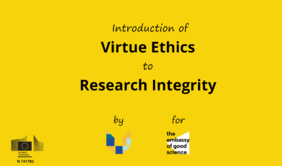Introduction of virtue ethics to research integrity
Introduction of virtue ethics to research integrity
This module is part of the VIRT2UE online course and should be taken after completing the first introductory module: "Introduction to research integrity". After taking this module trainees are invited to proceed to the next module "Virtue ethics applied under current research conditions".
You need to have a background in research (i.e. be employed as researchers) or be a trainer/educator/teacher who has had experience in research in the past.What is this about?
By taking this interactive module you will learn about and reflect on:
- Key characteristics of virtue ethics: After watching an introductory video on virtue ethics, you will answer answer a set of questions that aim to summarize the most relevant characteristics of virtue ethics.
- Moral conflict and a moral dilemma: After an introduction to the concepts you will be asked to apply these concepts while analysis two cases from the Rotterdam Dilemma Game, one of which portrays a moral conflict, the other one a moral dilemma.
- Your own aspirations to become a more virtuous researcher: After reflecting on your overarching goals as researchers at the end of the module, you will be asked to identify the three most important virtues that describe the kind of researcher you want to be (or become).
- The influence of moral exemplar(s) on moral development and the cultivation of virtues: After reflecting on how virtues are learnt, and taught, and what a good role model/mentor entails, you will be asked to reflect on a particular situation, in which someone you looked up to inspired you to act more virtuously.
Why is this important?
Practical Tips
Remarks
What is this about?
This interactive e-learning module provides an introduction to virtue ethics and its relevance for research integrity. By taking this module learners will need to:
- Demonstrate a basic understanding of key characteristics of virtue ethics. After watching an introductory video on virtue ethics, learners are required to answer a set of five multiple choice questions that aim to summarize the most relevant characteristics of virtue ethics. Learners get instant feedback on whether their responses are correct or not.
- Distinguish between a moral conflict and a moral dilemma. In an exercise that follows information about the difference between the concepts of values and norms, as well as moral conflicts and moral dilemmas, learners are required to apply these differentiations and transfer their knowledge into distinguishing two cases from the Rotterdam Dilemma Game, one of which portrays a moral conflict, the other one a moral dilemma.
- Identify with their own aspirations to become a more virtuous researcher. In a two-step exercise, learners are first invited to write their own obituary/laudatio, which requires them to adopt a perspective of temporal distance (a look into the future) and simultaneously an inter- rather than an intrapersonal perspective at themselves as researchers. This way, they may reflect on their overarching goals as researchers that may differ from their everyday aspirations. At the end of the module, learners are asked to identify the three most important virtues that the description of themselves entails.
- Reflect on the influence of moral exemplar(s) on moral development and the cultivation of virtues. In a reflection exercise following information on how virtues are learnt, and taught, and what a good role model/mentor entails, learners are invited to reflect on a particular situation, in which someone they looked up to inspired them to act more virtuously.
Why is this important?
Practical Tips
Experience the online module
Click on the link http://courses.embassy.science/introduction_of_virtue_ethics_to_research_integrity/sto


